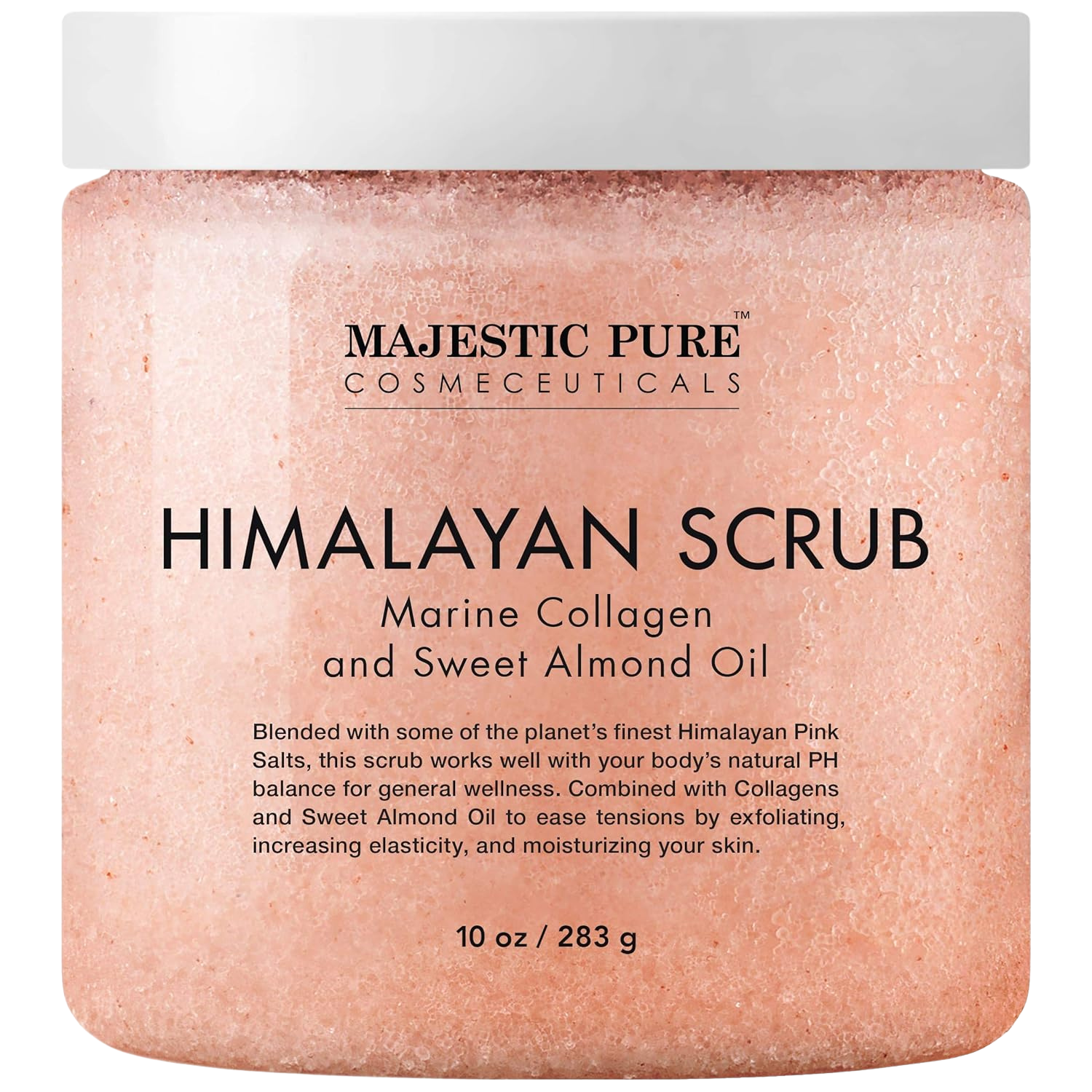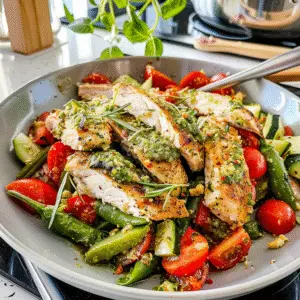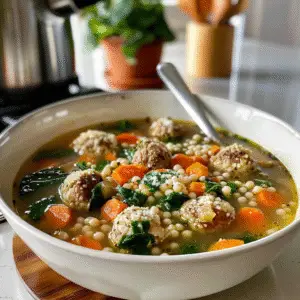Introduction and Quick Summary
Balsamic roasted carrots are the perfect addition to any meal. This simple yet elegant dish showcases the natural sweetness of carrots enhanced by a rich balsamic glaze. Whether you’re preparing a weeknight dinner or hosting a special occasion, these roasted carrots will impress your guests and family alike. The combination of flavors creates a delightful balance between savory and sweet, making it an excellent side dish for meats or vegetarian meals.
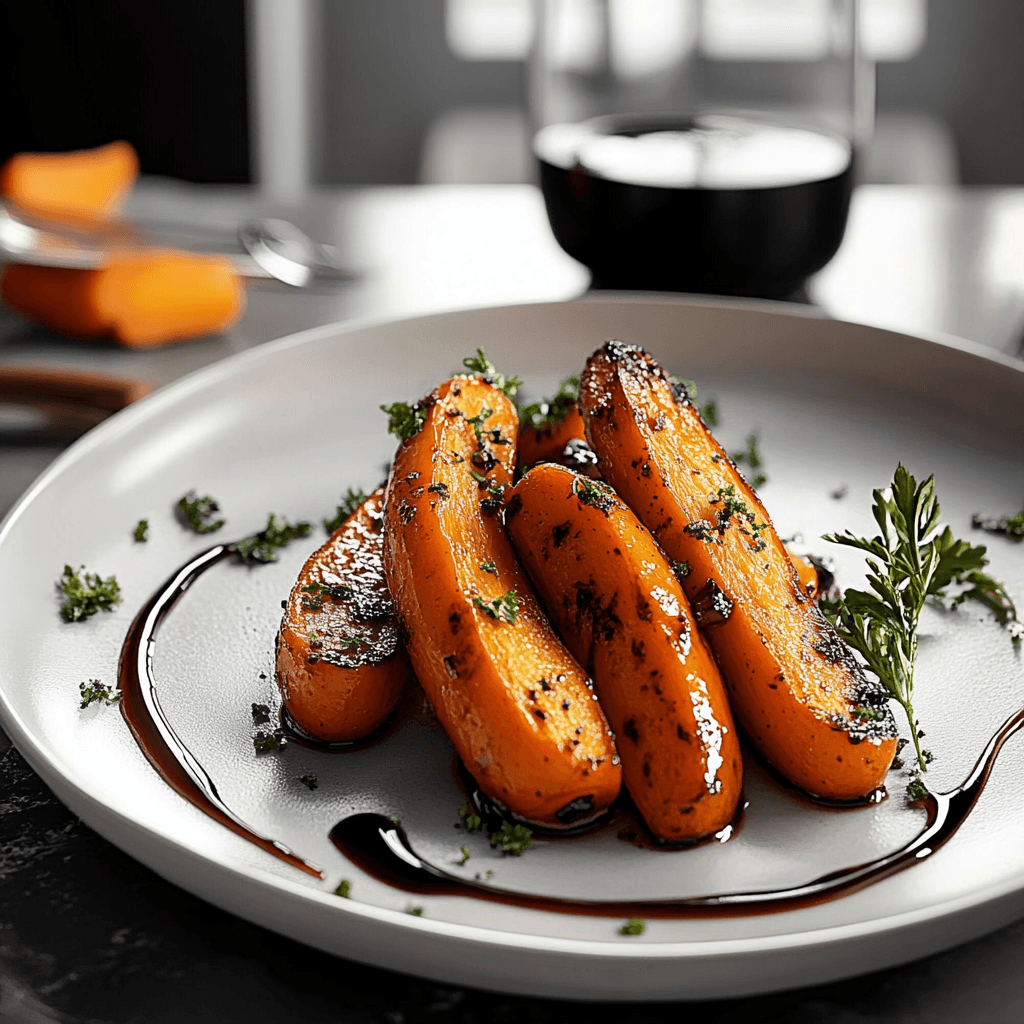
In just a few steps, you can transform ordinary carrots into a gourmet dish that looks as good as it tastes. The caramelization process during roasting elevates their flavor profile while the balsamic vinegar adds depth and brightness. Plus, this recipe is not only easy to make but also customizable; you can add herbs or spices to suit your taste preferences. So if you’re looking for a quick yet scrumptious vegetable side dish that will elevate your dining experience, look no further than this recipe for balsamic roasted carrots.
Main Ingredients
Fresh Carrots
Carrots are the star of this dish. About 1 pound of fresh, medium-sized carrots will do the trick. Look for firm and vibrant orange ones without blemishes. These will roast beautifully and provide that perfect sweetness when cooked.
Balsamic Vinegar
You will need 3 tablespoons of high-quality balsamic vinegar for this recipe. Opting for aged balsamic will give your dish a richer flavor profile. This ingredient is crucial as it adds both sweetness and acidity to balance the flavors.
Olive Oil
Using 2 tablespoons of extra virgin olive oil ensures that the carrots roast perfectly without drying out. The olive oil helps in achieving that golden-brown color while enhancing the natural flavors of the vegetables.
Honey
Adding 1 tablespoon of honey complements the acidity of the balsamic vinegar beautifully. It also helps in caramelizing the carrots during roasting, resulting in a sweet glaze that ties everything together.
Salt and Pepper
A teaspoon each of salt and freshly ground black pepper will enhance all the flavors in this dish. Adjust these according to your taste preferences to ensure that every bite is perfectly seasoned.
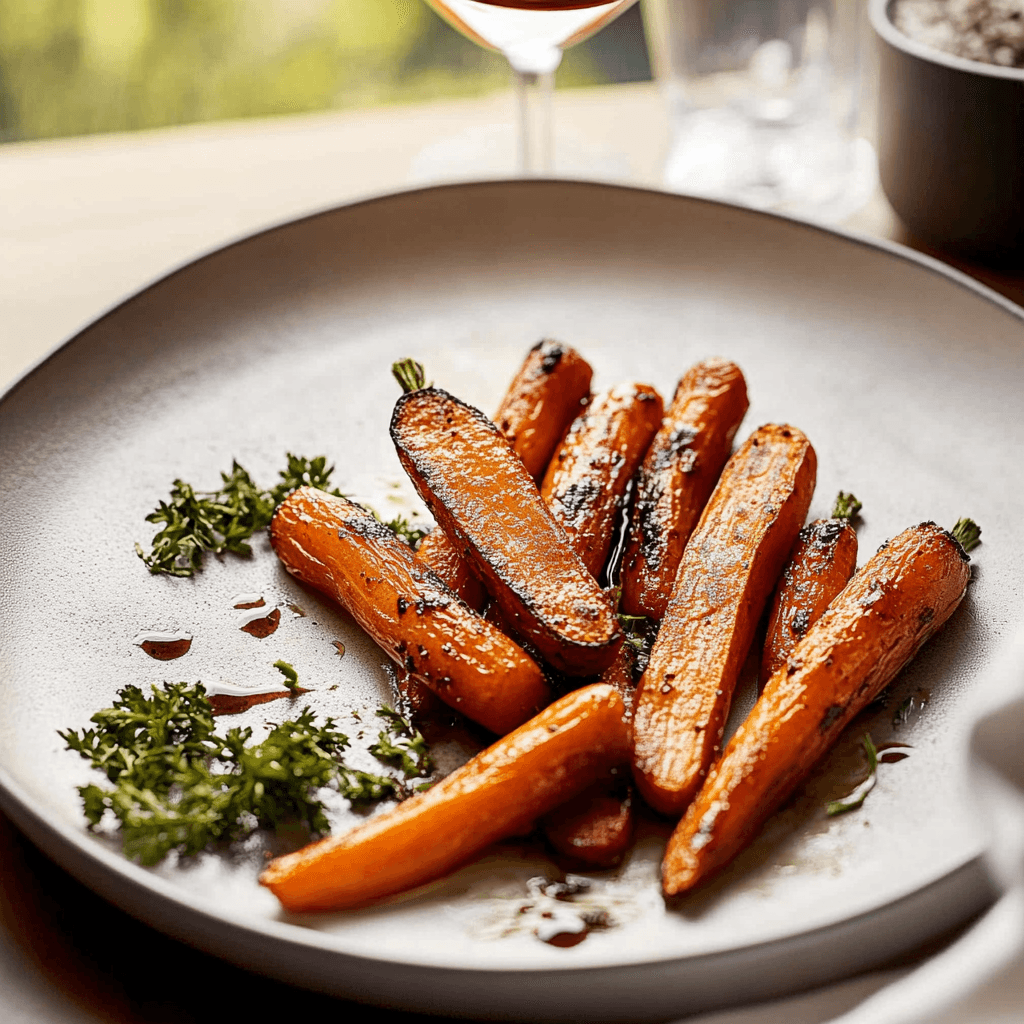
How to Prepare Balsamic Roasted Carrots
Step 1: Preheat Your Oven
Start by preheating your oven to 425°F (220°C). This temperature is ideal for roasting vegetables as it allows them to cook evenly while developing those lovely caramelized edges you want from roasted carrots.
Step 2: Prepare the Carrots
Wash your fresh carrots thoroughly under running water to remove any dirt or debris. Peel them using a vegetable peeler if desired; this step is optional as leaving some skin on can add extra texture and nutrients. Cut the carrots into even-sized pieces—about 2 inches long works well—to ensure they cook uniformly.
Step 3: Mix the Glaze
In a mixing bowl, combine 3 tablespoons of balsamic vinegar, 2 tablespoons of extra virgin olive oil, and 1 tablespoon of honey. Whisk these ingredients together until well blended. This mixture will serve as both a marinade and glaze for your roasted carrots.
Step 4: Coat the Carrots
Place your prepared carrot pieces in another large bowl or on a baking sheet lined with parchment paper. Drizzle your balsamic glaze over them generously. Toss everything together until all pieces are evenly coated; this ensures every carrot gets that delicious flavor infusion during cooking.
Step 5: Roast Them
Spread the glazed carrot pieces out on your baking sheet in a single layer—this prevents steaming and promotes even roasting. Bake them in your preheated oven for about 25-30 minutes or until they turn tender and caramelized around the edges; make sure to stir halfway through cooking to promote even browning.
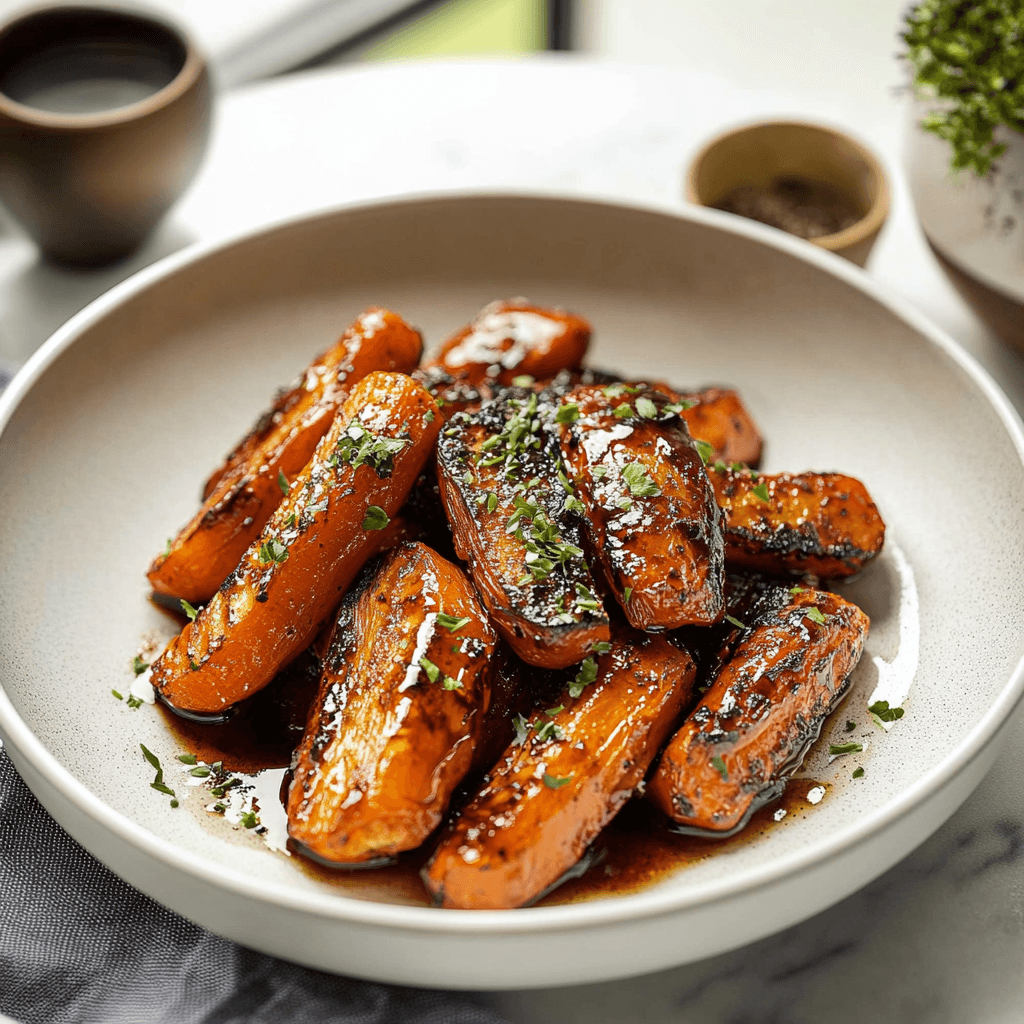
Serving and Storing Tips
Serving Suggestions
Balsamic roasted carrots are incredibly versatile when it comes to serving options. They pair wonderfully with grilled chicken or fish, adding both color and palatable delight to your plate. You can also serve them alongside quinoa or couscous for a healthy vegetarian option; their sweetness complements grains beautifully.
Consider garnishing with fresh herbs like parsley or thyme before serving to add an aromatic touch that enhances presentation as well as flavor profiles! You can serve them warm straight from the oven or let them cool slightly before placing them on a serving platter.
Storing Leftovers
If you have leftovers—which is often not the case given how delicious they are—you can store them in an airtight container in the fridge for up to three days. To reheat, simply toss them back into an oven at about 350°F (175°C) until warmed through again; this keeps their texture close to fresh-roasted quality.
Freezing is another option if you want longer-term storage; however, it’s best enjoyed fresh due to changes in texture upon thawing—recommendations suggest consuming within three months if frozen! Always allow any cooked vegetables time to cool before transferring them into freezer-safe bags or containers to prevent moisture buildup which could lead spoilage later on down-the-line!
Mistakes to avoid
When preparing Balsamic Roasted Carrots, several common mistakes can affect the dish’s flavor and texture. First, avoiding unevenly sized carrot pieces is crucial. If some carrots are thicker than others, they will cook at different rates. This inconsistency can lead to some carrots being undercooked while others may become overly soft. To achieve uniform cooking, slice all carrots into even pieces, ideally about one inch thick.
Another mistake is not preheating the oven sufficiently. Balsamic Roasted Carrots benefit from a hot oven to caramelize properly. If the oven isn’t hot enough, the carrots will steam instead of roast, resulting in a bland texture. Always preheat your oven to at least 425°F (220°C) before placing your carrots inside.
Using low-quality balsamic vinegar is another pitfall to avoid. The flavor of the balsamic glaze directly impacts the sweetness and acidity of the dish. Opt for a high-quality aged balsamic vinegar that adds depth and richness. Cheaper alternatives often lack complexity and can make your Balsamic Roasted Carrots taste flat.
Lastly, don’t skimp on seasoning. While balsamic vinegar adds flavor, using salt and pepper enhances the overall taste profile of your dish. A generous pinch of salt will bring out the natural sweetness of the carrots, while freshly cracked pepper adds an element of warmth and spice.
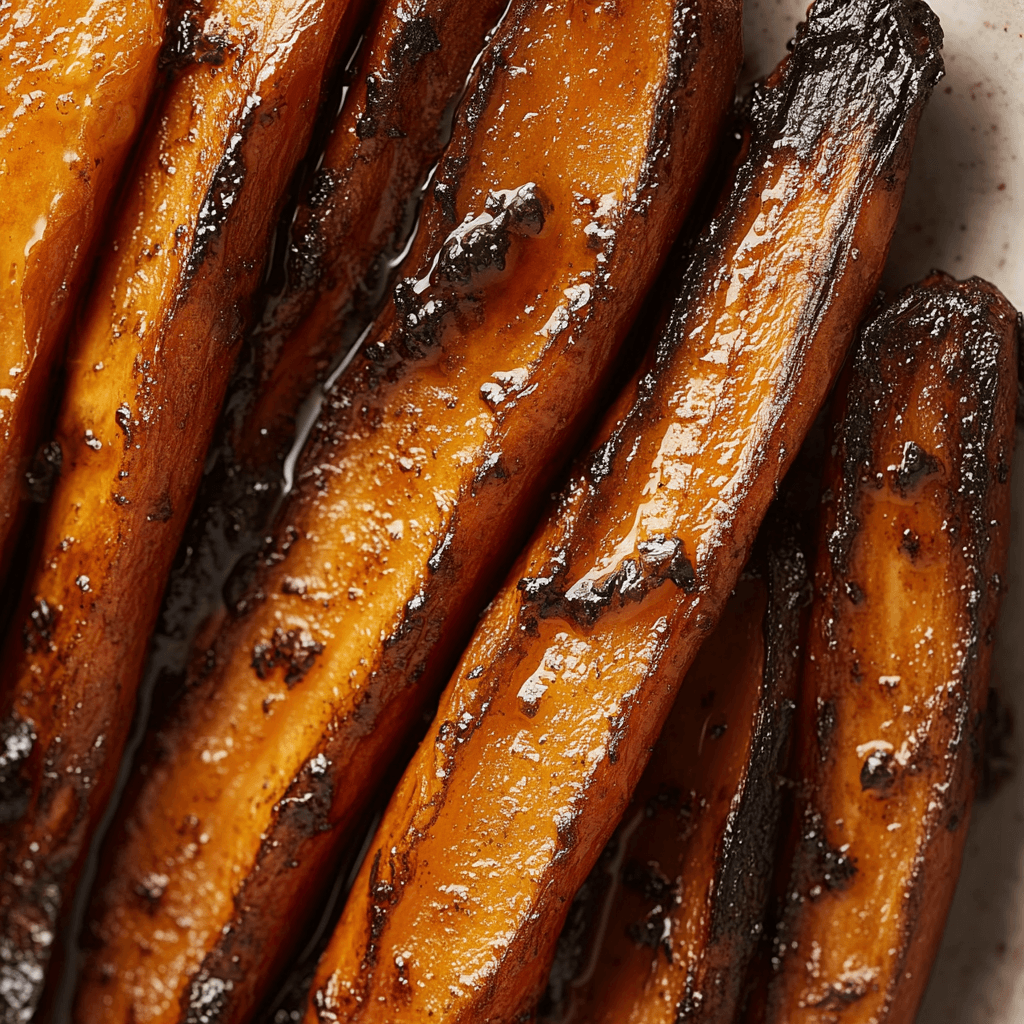
Tips and tricks
To elevate your Balsamic Roasted Carrots, consider using fresh herbs for added flavor. Herbs like thyme or rosemary complement the sweetness of the carrots beautifully and enhance overall aroma when roasting. Add them during the last few minutes of cooking to keep their flavors vibrant.
Another tip is to experiment with additional ingredients such as garlic or shallots. Tossing minced garlic or thinly sliced shallots with your carrots before roasting introduces a savory note that balances well with the sweetness of balsamic vinegar.
For those looking for a bit of crunch, sprinkle some nuts like walnuts or pecans over your finished dish. Toasted nuts add texture and a nutty richness that makes Balsamic Roasted Carrots even more delicious.
Consider marinating your carrots briefly in balsamic vinegar before roasting them for extra flavor infusion. Simply toss them in a bowl with balsamic vinegar and let them sit for about 15-30 minutes before cooking. This step allows the flavors to meld better during roasting.
Finally, always taste and adjust seasoning just before serving. Each batch may vary slightly based on carrot size or freshness, so ensure you have balanced flavors by tasting beforehand.
Suggestions for Balsamic Roasted Carrots
For those wanting to switch things up with their Balsamic Roasted Carrots, try incorporating other vegetables into the mix. Root vegetables like parsnips or sweet potatoes roast well alongside carrots and add different flavors and textures to your dish. Additionally, consider mixing in Brussels sprouts for a delightful contrast in taste.
If you’re looking for a pop of color, beets are an excellent addition as they roast beautifully alongside carrots while providing a vibrant hue that makes your presentation more appealing.
Also, think about varying your balsamic glaze by adding honey or maple syrup for extra sweetness if desired. This adjustment can create an interesting balance between sweet and tangy flavors that enhance your dish’s complexity.
For added depth in flavor profiles, consider using flavored olive oil instead of regular olive oil when roasting your carrots. Oils infused with herbs or spices can introduce subtle nuances that elevate this simple side dish into something extraordinary.
Lastly, serve your Balsamic Roasted Carrots on top of a bed of mixed greens or quinoa for a complete meal experience that includes protein and fiber while showcasing bright colors on your plate.
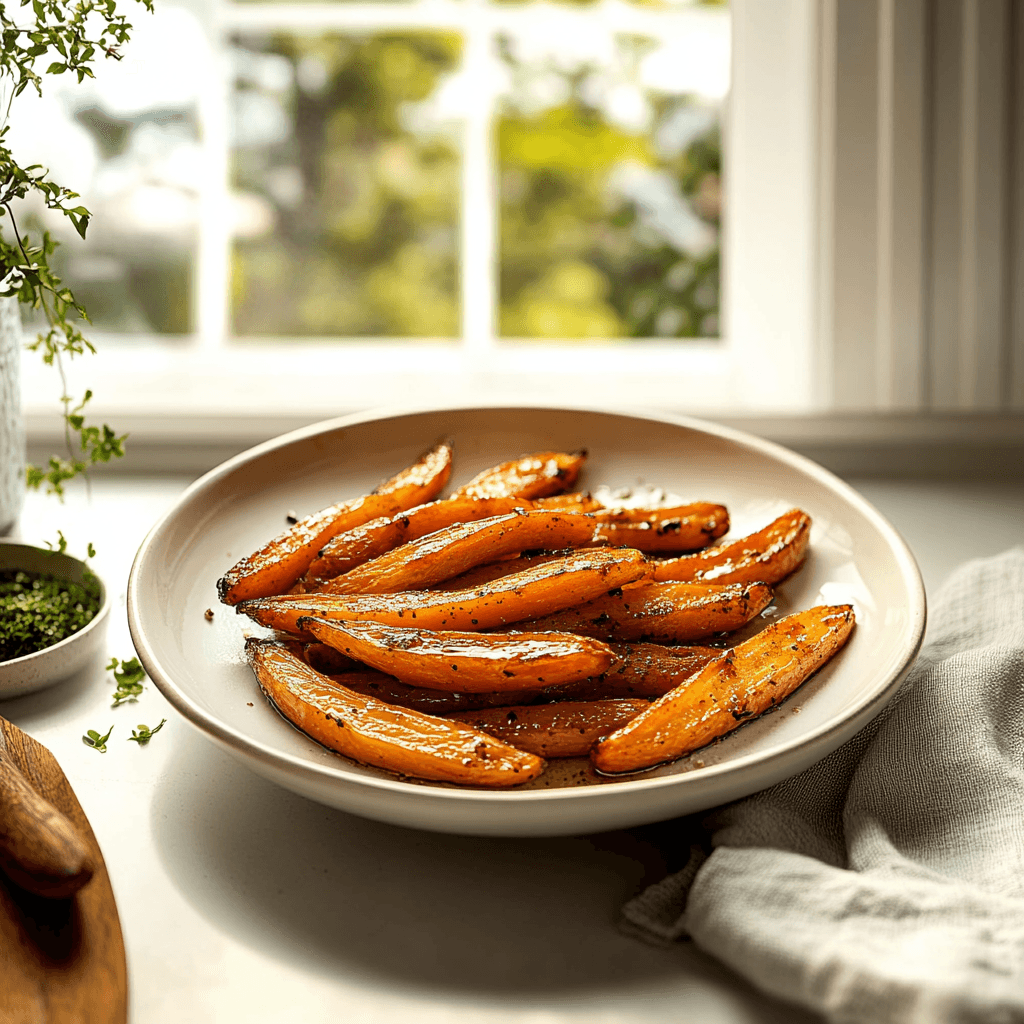
FAQs
How long should I roast my Balsamic Roasted Carrots?
Roasting time depends primarily on carrot thickness and desired tenderness levels; typically, you’ll need around 20-30 minutes at 425°F (220°C). For thinner slices, check after 15 minutes; for thicker pieces, you might require closer to 35 minutes. Remember to toss them halfway through cooking for even roasting.
Can I prepare Balsamic Roasted Carrots ahead of time?
Absolutely! You can prep Balsamic Roasted Carrots by cutting them and marinating them in balsamic vinegar several hours prior or even overnight if stored correctly in an airtight container in the fridge. Roast just before serving to maintain optimal freshness and texture.
What type of balsamic vinegar should I use?
Using high-quality aged balsamic vinegar is ideal as it offers rich flavors that enhance your Balsamic Roasted Carrots significantly compared to standard grocery store brands. Look for vinegars labeled “traditional” or “aceto balsamico” for best results.
Are there any alternatives to roasted carrots?
Yes! You can substitute other root vegetables such as parsnips or sweet potatoes if you desire variety in texture and flavor within this recipe framework while still enjoying that characteristic tangy-sweet profile provided by balsamic vinegar!
How do I know when my carrots are done roasting?
The perfect way to assess doneness is through tenderness tests using a fork; they should pierce easily without excessive resistance but retain some firmness without becoming mushy—this ensures they have caramelized nicely yet maintain shape integrity!
Can I add other seasonings besides salt and pepper?
Certainly! Feel free to experiment with spices like smoked paprika or cumin alongside fresh herbs such as thyme or rosemary when preparing Balsamic Roasted Carrots—these additions bring unique layers of flavor while complementing existing tastes beautifully!
Conclusion
Balsamic Roasted Carrots are not only delicious but also versatile enough for various meals throughout the year! By avoiding common mistakes such as uneven cutting sizes or low-quality ingredients like cheap vinegars while incorporating tips like marinating beforehand or adding complementary vegetables enhances both flavor profiles tremendously! Experimenting with herbs can truly elevate this simple side dish into something extraordinary worth sharing at any gathering! Lastly—don’t forget seasoning adjustments before serving; always trust your palate—as it ultimately leads toward achieving perfectly balanced dishes everyone will love!

